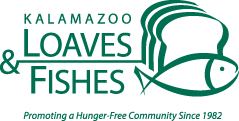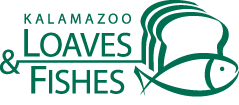Follow Us x
Who is struggling with food insecurity in Kalamazoo County?
There is no typical face to hunger. Over 36,000 individuals, including nearly 8,700 local children as well as seniors, struggle with food insecurity each day in Kalamazoo County.
What is Food Insecurity?
Food insecurity is the state of being without reliable access to a sufficient quantity of affordable, nutritious food.
How many individuals does KLF serve daily?
Through our hunger-relief programs, KLF serves approximately 850 people per day. Food is provided through a network of pantry locations, school-based programs, county-wide home delivery, mobile food distributions, and targeted outreach efforts.
Forty percent (40%) of the people served by our Grocery Pantry Program are under the age of 18.
Forty percent (40%) of the people served by our Grocery Pantry Program are under the age of 18.
How is KLF funded?
The majority of our donations come from individuals, corporations, and faith-based groups as well as grant-funding from local foundations. Less than 3% of resources come from government funding.
Where does KLF food come from?
At the current time, KLF purchases approximately 50% of its food from the wholesale market. Forty percent (40%) of food comes from the United States Department of Agriculture (USDA). The remaining 10% comes from farm donations, food drives, and grocery store food rescue.
How does a person access food from KLF through the Grocery Pantry Program?
Anyone in Kalamazoo County can receive food twice per calendar month. Need is self-declared; no proof of income or ID is required. To schedule an appointment or delivery, contact KLF's Need Food Line (269.343.3663) or email info@kzoolf.org.
How many food orders did KLF serve last year?
In 2024, KLF served 194,170 food orders to over 38,738 unduplicated individuals.
When the economy is improving, why is the need for food increasing?
Many factors impact food insecurity including jobs, underemployment, education, housing, childcare, and rising healthcare costs. An improving economy does not always equate to higher wages or a lack of hardship.
Why doesn't KLF have stricter eligibility requirements? How are you preventing people from cheating the system?
We believe that the overwhelming majority of people requesting and receiving KLF services need them. Since clients can call directly for food assistance on a monthly basis, or utilize our Mobile Food Initiative, there is little benefit to "cheating". At the end of the day, alleviating hunger in our community is our primary concern and where we spend our energy. In Kalamazoo County, over 26% of families earn too much to qualify for governmental assistance, but do not earn enough to meet the basic cost of living for the area. Our practices allow us to support those who don't qualify for SNAP benefits and other people who aren't consistently able to put nutritious food on the table.
Why could someone receiving SNAP benefits need KLF's services?
SNAP benefits are income based and dependent upon the number of people per household. While SNAP benefits are a great help to someone in need, they often don't cover the amount of food a household needs each month.
Don't food banks only provide high-sodium canned/boxed foods?
KLF makes a concerted effort to provide fresh food to clients on a daily basis either through donations from farmers and grocery stores or by purchasing it at wholesale prices. We also stress the importance of low sugar/sodium food donations. Our top distributed food items in 2024 were proteins and fresh produce!
What is the difference between KLF and the South Michigan Food Bank?
The South Michigan Food Bank is a member of the national charitable network Feeding America and procures and distributes food to agencies in their eight county service area, including Kalamazoo County. Kalamazoo Loaves & Fishes is an independent food bank and pantry network providing direct, tailored services to individuals, families, schools, and non-profit organizations in Kalamazoo County. We meet quarterly with the South Michigan Food Bank to discuss programming and avoid duplication of services.
Is KLF a religious organization?
No, KLF is not a religious organization. KLF is registered as an independent non-profit organization. While our name originates from Judeo-Christian roots, KLF is a secular organization without formal ties to any one denomination or faith. KLF was founded by members of several downtown churches, and the name was chosen by those who first initiated our organized community response to local hunger. However, from the very beginning, KLF has believed that food is a basic human right. Nothing should stand between hungry people and food, including their religious beliefs.
Is KLF a government agency?
No, we are an independent non-profit governed by a Board of Directors.
Does KLF receive funding from the United Way of South Central Michigan?
No, KLF is not funded by the United Way of South Central Michigan. However, if a donor designates their United Way gift to KLF, it will be passed along to us.
What goes further at KLF - food or fund donations?
With our large purchasing power, we are able to stretch every donated dollar into three meals for a person facing food insecurity. However, food donations provide our pantries with the important variety we need to meet the food requirements clients may need due to a medical condition, allergies, or religious beliefs.
How much of my financial donation goes to KLF food?
Only 9% of your donation goes to administrative costs. The other 91% goes directly to helping people-in-need.
How many people will I feed with my KLF donation?
With $1 we can provide a person struggling with hunger enough nutritionally-balanced food for three full meals.
How does KLF address hunger on a larger scale?
We work on advocacy initiatives, policies, and programs that promote food security at the local, state, and national level. We also participate in Kalamazoo County's Hunger-Free Coalition, a group of community advocates working together to identify and spearhead projects to end local hunger.
How does KLF collaborate with other agencies on promoting a hunger-free community?
Through over 110 distribution sites, referral partners, and community members, we collaborate with organizations that share our vision for a hunger-free community.
How does KLF preserve the dignity of those they serve?
KLF clients have access to fresh and non-perishable food to meets dietary and cultural needs. KLF also strives to provide food to clients in multiple ways (at our pantries, through Mobile Food Initiatives, via home delivery, and more) to try to meet people where they're at rather than having a one-size-fits-all model.
How often can I volunteer for KLF?
Our volunteers are the heart and soul of the organization and can pitch in once or become one of our regulars. Those interested in volunteering can contact Jillian, our Volunteer Coordinator, at jillian@kzoolf.org.
How can I donate to KLF?
Monetary donations can be made online at kzoolf.org and checks can be mailed to 901 Portage St, Kalamazoo, MI 49001. To learn how to creatively raise funds for KLF, contact our Associate Director, Greta Faworski at greta@kzoolf.org or at 269.488.2617 ext. 208. Food donations can be dropped off at our Portage Street location Mon.-Fri. from 8:00 am to 4:00 pm.
How can I stay informed about what is going on?
Join us on Facebook or Instagram, sign up for our bi-monthly newsletter at kzoolf.org, and check our website frequently for news and information.
This institution is an equal opportunity provider. For more information, click here.
Contact Us
901 Portage St, Kalamazoo, MI 49001
Need Food Line: (269) 343-3663
Administrative Office: (269) 488-2617
info@kzoolf.org
Need Food Line: (269) 343-3663
Administrative Office: (269) 488-2617
info@kzoolf.org
- Copyright © 2026 Kalamazoo Loaves & Fishes, all rights reserved.
- 901 Portage St, Kalamazoo , MI 49001 (269) 343-3663



